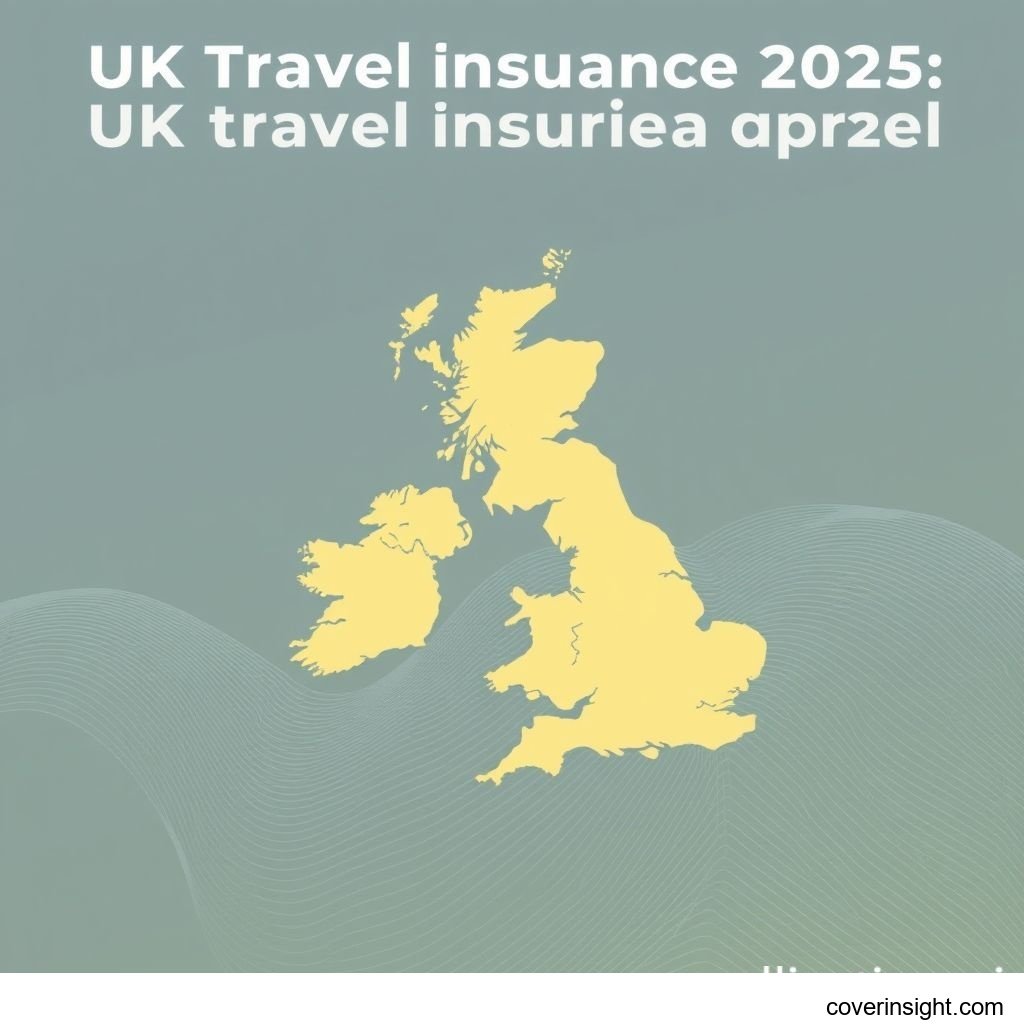Essential UK Travel Insurance: Medical Cover & EHIC 2025
Introduction
Planning a trip within Great Britain for 2025? Whether it's a short break or an extended stay, understanding your insurance needs is crucial. While many assume domestic travel negates the need for cover, having robust 90 day travel insurance is increasingly important, particularly for unexpected medical emergencies or trip cancellations. This comprehensive guide will walk you through why comprehensive travel insurance is not just a recommendation but an essential layer of protection for residents travelling across GB, ensuring peace of mind during your adventures.
Coverage Details
Navigating the complexities of travel insurance can be daunting, but understanding what your policy covers, and equally important, what it doesn't, is vital. For those planning longer trips, securing appropriate 90 day travel insurance is a key step towards a worry-free experience.
What’s Included
A comprehensive 90 day travel insurance policy typically offers a broad spectrum of benefits designed to protect you from various unforeseen circumstances. These often include:
-
Medical Emergencies: Covers costs for accident and emergency treatment, hospital stays, and medical repatriation if necessary. This is especially critical even within GB, as private medical costs can be substantial, and NHS services might not cover all associated expenses like travel or accommodation for family.
-
Trip Cancellation and Interruption: Reimburses non-refundable expenses if your trip is cancelled or cut short due to covered reasons like illness, injury, or bereavement.
-
Baggage and Personal Belongings: Provides compensation for lost, stolen, or damaged luggage, passports, and other personal items.
-
Travel Delay and Missed Connections: Offers financial assistance for additional expenses incurred due to significant travel delays or missed onward connections.
-
Personal Liability: Protects you if you accidentally cause injury to someone or damage their property while travelling.
-
Personal Accident: Offers a lump sum payment in the event of serious injury or death during your trip.
It's important to review the policy wording carefully to understand the specific limits and conditions for each benefit.
Common Exclusions
While offering extensive protection, 90 day travel insurance policies also come with exclusions. Being aware of these can prevent unwelcome surprises:
-
Pre-existing Medical Conditions (Undisclosed): Failing to declare pre-existing conditions at the time of application can invalidate your medical cover.
-
High-Risk Activities: Engaging in extreme sports (e.g., bungee jumping, rock climbing) without specific additional cover.
-
Alcohol or Drug-Related Incidents: Injuries or incidents occurring under the influence of alcohol or non-prescription drugs.
-
Illegal Acts: Losses or damages arising from involvement in illegal activities.
-
War and Civil Unrest: Incidents occurring in areas affected by war, civil commotion, or terrorism, unless explicitly covered.
-
Change of Mind: Simply deciding not to travel is not usually a valid reason for cancellation claims.
-
Unsupervised Belongings: Theft of luggage or personal items left unattended.
Always read the Policy Wording or Insurance Product Information Document (IPID) before purchasing, as specific exclusions can vary significantly between providers.
EHIC Replacement and Medical Coverage
For UK residents, particularly those accustomed to the benefits of the European Health Insurance Card (EHIC) or its successor, the Global Health Insurance Card (GHIC), understanding medical cover within GB is distinct. While NHS services are generally free at the point of use for residents, EHIC replacement coverage is not applicable for domestic travel. Here's why additional medical cover from 90 day travel insurance remains crucial.
Understanding EHIC and GHIC
The EHIC and GHIC provide access to state-provided healthcare during a temporary stay in EU countries. They are not applicable for travel within the UK. In GB, residents are entitled to NHS care. However, even with the NHS, there can be hidden costs or significant inconveniences not covered, which a good travel insurance policy addresses. These include:
-
Ambulance costs (in certain non-emergency scenarios or if transported across different NHS trusts for specialist care).
-
Repatriation costs: If you need to be moved from a remote area to a hospital closer to home, or require specialist transport.
-
Accommodation and travel expenses for family members: If you're hospitalised far from home, insurance can cover costs for a family member to be with you.
-
Loss of income: If an injury prevents you from working upon return.
-
Private medical treatment: Should you opt for or require private care (though most travel insurance focuses on emergency state-provided care).
The Role of 90 Day Travel Insurance for Medical Needs
For a trip within GB, especially one extending to a 90 day travel insurance period, your policy acts as a vital safety net beyond the NHS. It fills the gaps not covered by public healthcare. This includes:
-
Emergency Medical Transport: Covering the cost of air ambulance or specialised ground transport if you suffer a serious injury or illness in a remote part of GB and require transfer to a major medical facility or back home.
-
Extended Stays for Recovery: If an illness or injury requires a prolonged recovery period before you can return home, the policy might cover additional accommodation and living expenses.
-
Financial Support: Providing a lump sum for permanent disability or accidental death benefits, offering financial relief to you or your family.
-
Assistance Services: Many policies offer 24/7 assistance lines, which can help with navigating local medical services, arranging appointments, or even translating if necessary.
While the NHS provides excellent care, relying solely on it for longer domestic trips, particularly in areas far from home, might leave you exposed to significant indirect costs. A dedicated 90 day travel insurance policy ensures these potential financial burdens are mitigated, offering genuine peace of mind.
Senior Travel Insurance Considerations
As individuals enjoy their golden years, travel often becomes a more significant part of life. However, finding appropriate cover can sometimes be more complex. This is where specialised senior travel insurance becomes invaluable, especially for trips requiring 90 day travel insurance in 2025.
Tailored Policies for Older Travellers
Many standard travel insurance policies have age limits or higher premiums for older travellers. Senior travel insurance is specifically designed to meet the unique needs of older adventurers, often providing:
-
No Upper Age Limit: A significant number of policies are now available without an upper age limit, ensuring coverage regardless of how old you are.
-
Comprehensive Medical Coverage: This is often the cornerstone of senior policies, understanding that older travellers may be more prone to medical issues. It typically includes higher limits for emergency medical expenses.
-
Dedicated Customer Support: Some providers offer specialised teams trained to assist older customers with their specific concerns or needs during the application process or a claim.
-
Flexibility: Options for single trip or annual multi-trip policies, allowing seniors to choose what best fits their travel frequency.
When seeking senior travel insurance, it's crucial to compare policies carefully. Look beyond just the price and focus on the depth of medical cover, repatriation services, and assistance benefits. Organisations like the Association of British Insurers (ABI) can offer guidance on what to look for when purchasing insurance.
Navigating Pre-existing Conditions
One of the most common concerns for older travellers is how pre-existing medical conditions affect their insurance. It's imperative to declare all pre-existing conditions, no matter how minor they seem. Failure to do so could lead to your claim being denied.
Here’s how senior travel insurance addresses this:
-
Medical Screening: Most policies require a medical screening process, either online or over the phone. This helps the insurer assess the risk and offer an appropriate premium.
-
Specialist Providers: There are many insurers who specialise in covering pre-existing conditions, often able to offer competitive rates even for complex medical histories.
-
Condition-Specific Coverage: Some policies might offer specific coverage for certain conditions, or conversely, exclude cover for conditions that are not stable or are undergoing active treatment.
-
Waivers and Exclusions: In some cases, an insurer might offer a policy but exclude cover for claims directly related to a declared condition, or apply a higher excess.
Always be honest and thorough during the medical declaration process. While it might lead to a higher premium, it ensures that your 90 day travel insurance policy will provide the intended protection when you need it most. Seeking advice from the Financial Conduct Authority (FCA) website can also provide further insights into your rights as a consumer purchasing financial products like insurance.
Cost Analysis
Understanding the cost of 90 day travel insurance is key to budgeting for your trip. While premiums can vary widely, several factors influence the final price.
Price Factors
The cost of your 90 day travel insurance policy is determined by a combination of personal details and policy choices:
-
Age of Traveller: Generally, premiums increase with age due to a higher perceived risk of medical claims. This is a significant factor, especially for senior travel insurance.
-
Pre-existing Medical Conditions: As discussed, undeclared or serious conditions will likely lead to higher premiums or exclusions.
-
Level of Coverage: A comprehensive policy with higher limits for medical expenses, cancellation, and baggage will naturally cost more than a basic policy.
-
Trip Duration: For 90 day travel insurance, the longer the trip, the higher the premium compared to shorter stays.
-
Chosen Excess: A higher voluntary excess (the amount you pay towards a claim) can lower your premium, but means you'll pay more out-of-pocket if you need to claim.
-
Inclusions (e.g., Sports Activities): Adding cover for specific activities like winter sports or extreme sports will increase the premium.
-
Number of Travellers: Family policies or policies covering multiple individuals often offer better value than individual policies bought separately.
Saving Tips
While cost is a factor, never compromise on essential cover. Here are ways to potentially save on your 90 day travel insurance without sacrificing critical protection:
-
Compare Quotes: Use comparison websites and get quotes directly from several insurers. Prices for similar policies can vary significantly.
-
Buy Early: While not always a huge saving, purchasing your policy shortly after booking your trip can be slightly cheaper and provides immediate cancellation cover.
-
Choose the Right Excess: Opt for a higher excess if you're comfortable paying more in the event of a claim. Just ensure it's an amount you can realistically afford.
-
Declare Accurately: Provide accurate medical information. While it might seem counter-intuitive, under-declaring conditions could lead to your policy being invalid, leaving you with no cover at all.
-
Look for Bundles: If you travel frequently, an annual multi-trip policy might be more cost-effective than buying multiple single-trip policies, even if you only travel for a few 90 day travel insurance periods throughout the year.
-
Review Existing Policies: Check if you have any existing cover through bank accounts, credit cards, or home insurance that might offer some basic travel benefits, though these are rarely comprehensive enough for a 90-day trip.
-
Consider Insurer Reputation: While not a direct saving, choosing a reputable insurer with excellent customer service and a solid claims process can save you significant hassle and potential financial loss in the long run.
Choosing the Right 90 Day Travel Insurance Policy
Selecting the ideal 90 day travel insurance policy requires careful consideration of your specific needs, the nature of your trip, and your budget. It's not a one-size-fits-all solution, especially when looking at comprehensive EHIC replacement coverage needs within the UK or senior travel insurance.
Key Factors to Compare
When evaluating different policies, focus on these critical elements to ensure you get the best value and protection:
-
Medical Emergency Limits: Ensure the medical cover limit is substantial – ideally in the millions, even for domestic travel, to cover unexpected complexities.
-
Cancellation and Curtailment Cover: Check the maximum payout for non-refundable trip costs. This is crucial if your plans are disrupted.
-
Baggage and Personal Belongings: Look at the overall limit and per-item limits. Does it adequately cover the value of your possessions?
-
Personal Liability: A high liability limit offers peace of mind if you accidentally cause damage or injury.
-
Assistance Services: A 24/7 emergency helpline is invaluable for support when things go wrong.
-
Excess Amount: Understand how much you'll have to pay towards a claim before the insurer pays out.
-
Specific Exclusions: Always read the fine print to identify anything that might void your cover for your planned activities or health conditions.
-
Policy Reviews and Reputation: Check independent reviews to gauge customer satisfaction and claims handling efficiency.
-
Policy Wording Clarity: A good policy should be easy to understand, without excessive jargon.
The Application Process
Applying for 90 day travel insurance is generally straightforward, but it requires honesty and attention to detail.
-
Gather Information: Have your travel dates, destination details, and personal information (including any medical history for all travellers) ready.
-
Medical Declaration: Be prepared to answer detailed questions about pre-existing medical conditions, hospitalisations, and medications. This is critical for both standard and senior travel insurance policies.
-
Get Multiple Quotes: Use comparison sites and direct insurer websites to find a range of options that meet your specified criteria.
-
Review Policy Documents: Before purchasing, thoroughly read the Policy Wording and Insurance Product Information Document (IPID). These documents outline exactly what's covered, what's excluded, and your obligations as a policyholder.
-
Payment: Complete the payment process securely online.
-
Receive Documents: Ensure you receive and keep a copy of your policy documents, including your policy number and emergency contact details, accessible during your trip.
For UK residents, comprehensive resources like Insurance Resources Global, can offer general guidance on various insurance products. For specific GB-focused information, consider checking GB Insurance Home.
FAQs
Here are some frequently asked questions about 90 day travel insurance:
How much does 90 day travel insurance cost?
The cost varies significantly based on factors like age, pre-existing medical conditions, the level of cover chosen, and specific inclusions. For a 90 day travel insurance policy, prices can range from under £50 to several hundred pounds, especially for older travellers or those with complex medical histories requiring specialised senior travel insurance. Comparing quotes is the best way to get an accurate estimate.
What affects premiums?
Premiums are primarily affected by the traveller's age, declared pre-existing medical conditions, the sum insured for various benefits (especially medical cover), the chosen excess, and any additional cover for activities or specific items. The longer the trip, such as a 90 day travel insurance period, the higher the premium typically is compared to shorter trips.
Is it mandatory?
While travel insurance is not legally mandatory for domestic travel within GB, it is highly recommended. It provides crucial financial protection against unforeseen events that the NHS or other standard services might not cover, such as emergency repatriation, lost baggage, or trip cancellation.
How to choose?
To choose the right 90 day travel insurance, assess your specific needs (e.g., medical conditions, valuable items, planned activities), compare multiple quotes for the level of cover you require, pay close attention to medical limits and exclusions, and read reviews about the insurer's claims process. Don't just focus on the cheapest option; ensure it offers adequate protection.
Consequences of no coverage?
Without 90 day travel insurance, you would be personally responsible for all costs arising from unforeseen incidents during your trip. This could include significant medical bills if you need private treatment or emergency transport, replacement costs for lost or stolen luggage, and the full financial loss if you have to cancel your trip due to an emergency. The financial burden could be substantial, potentially running into thousands of pounds.








Comments